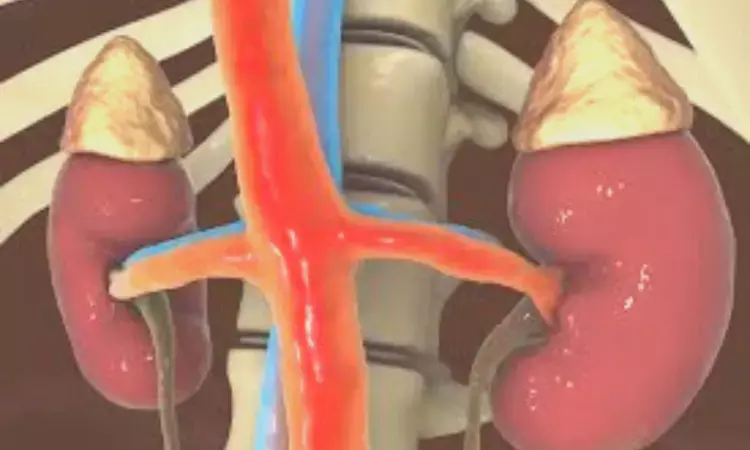- Home
- Medical news & Guidelines
- Anesthesiology
- Cardiology and CTVS
- Critical Care
- Dentistry
- Dermatology
- Diabetes and Endocrinology
- ENT
- Gastroenterology
- Medicine
- Nephrology
- Neurology
- Obstretics-Gynaecology
- Oncology
- Ophthalmology
- Orthopaedics
- Pediatrics-Neonatology
- Psychiatry
- Pulmonology
- Radiology
- Surgery
- Urology
- Laboratory Medicine
- Diet
- Nursing
- Paramedical
- Physiotherapy
- Health news
- Fact Check
- Bone Health Fact Check
- Brain Health Fact Check
- Cancer Related Fact Check
- Child Care Fact Check
- Dental and oral health fact check
- Diabetes and metabolic health fact check
- Diet and Nutrition Fact Check
- Eye and ENT Care Fact Check
- Fitness fact check
- Gut health fact check
- Heart health fact check
- Kidney health fact check
- Medical education fact check
- Men's health fact check
- Respiratory fact check
- Skin and hair care fact check
- Vaccine and Immunization fact check
- Women's health fact check
- AYUSH
- State News
- Andaman and Nicobar Islands
- Andhra Pradesh
- Arunachal Pradesh
- Assam
- Bihar
- Chandigarh
- Chattisgarh
- Dadra and Nagar Haveli
- Daman and Diu
- Delhi
- Goa
- Gujarat
- Haryana
- Himachal Pradesh
- Jammu & Kashmir
- Jharkhand
- Karnataka
- Kerala
- Ladakh
- Lakshadweep
- Madhya Pradesh
- Maharashtra
- Manipur
- Meghalaya
- Mizoram
- Nagaland
- Odisha
- Puducherry
- Punjab
- Rajasthan
- Sikkim
- Tamil Nadu
- Telangana
- Tripura
- Uttar Pradesh
- Uttrakhand
- West Bengal
- Medical Education
- Industry
Silodosin effective medical expulsive therapy for patients with ureteral stones; study reveals

Indonesia: A study investigating silodosin's efficacy as a medical expulsive therapy (MET) in patients with distal ureteral stones found that the treatment showed significantly lower stone expulsion time (SET), higher stone expulsion rate (SER), and lower use of analgesics as compared to placebo. The study findings were featured in the Indian Journal of Urology.
Medical expulsive therapy defines the medication used to facilitate ureteral stone passage before surgical intervention. The two classes of medication accepted ad MET are calcium channel blockers and alpha-blockers. Of these, alpha-blockers are the most frequently used option. Previous studies have proven the role of calcium channel antagonists, alpha-blockers, corticosteroids, and furosemide in assisting stones expulsion.
Several trials have also reported a pooled risk ratio of 1.54 for MET. A previous study has reported the rate of stone expulsion with silodosin at 82% and tamsulosin at 58%.[8] Among all the alpha-blockers, tamsulosin is most commonly used for MET, with a 19% improvement in the stone clearance rate for ureteral stones, especially in the distal ureter.[2] In 2015, Ding et al. suggested that tamsulosin does not alleviate ureteral colic.
The most commonly used medical expulsive therapy is tamsulosin. However, its use is associated with the limitation of its inability to alleviate ureteral colic. In this context, it becomes essential to develop MET that can decrease ureteral colic while maintaining a high stone clearance rate. Silodosin, an α1A adrenoceptor, has high selectivity and affinity for the distal ureter, which may reduce ureteral colic and enable stone expulsion for patients with distal ureteral stones.
Therefore, Johan Renaldo from Airlangga University in Indonesia and colleagues aimed to investigate the efficacy of silodosin as MET and its role in ureteral colic reduction in patients with distal ureteral stones.
The study was conducted according to the Cochrane Handbook for Systematic Reviews and Intervention, adhering to the PRISMA (Preferred Reporting Items for Systematic Reviews and Meta-Analyses). The researchers performed a comprehensive literature search in several online databases up to July 2021 for randomized trials comparing silodosin with placebo for medical expulsive therapy.
The study revealed the following findings:
- The analysis included a total of six randomized controlled trials comprising 907 patients.
- The analysis revealed that the patients who received silodosin had significantly higher stone expulsion rates (odds ratio [OR] 3.33), substantially shorter stone expulsion time (mean difference −3.79), and lower analgesic use (OR 0.4) compared to the group receiving placebo.
"Silodosin showed significantly lower stone expulsion time, higher stone expulsion rate, and lower use of analgesics in patients with distal ureteral stones versus a placebo," the researchers concluded.
Reference:
The study, "Silodosin as a medical expulsive therapy for distal ureteral stones: A systematic review and meta-analysis," was published in the Indian Journal of Urology. DOI: 10.4103/iju.iju_115_22
Dr Kamal Kant Kohli-MBBS, DTCD- a chest specialist with more than 30 years of practice and a flair for writing clinical articles, Dr Kamal Kant Kohli joined Medical Dialogues as a Chief Editor of Medical News. Besides writing articles, as an editor, he proofreads and verifies all the medical content published on Medical Dialogues including those coming from journals, studies,medical conferences,guidelines etc. Email: drkohli@medicaldialogues.in. Contact no. 011-43720751


